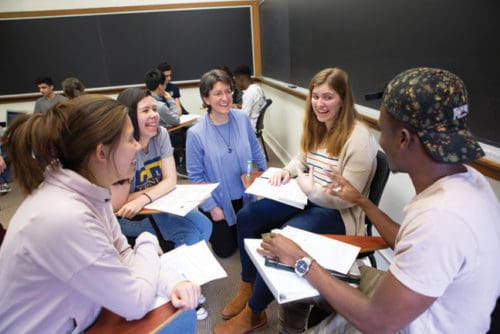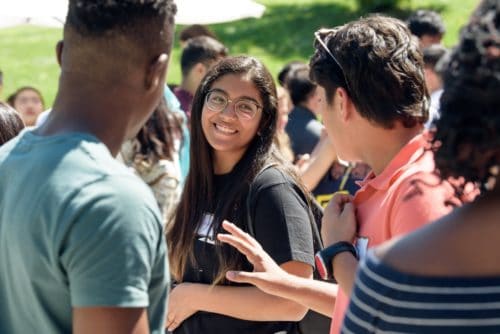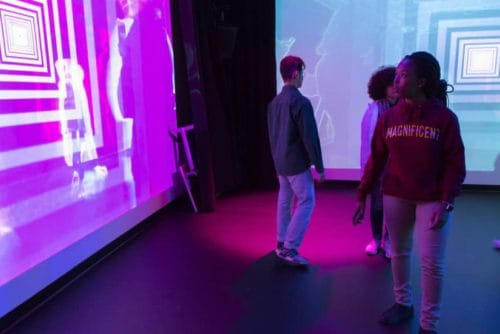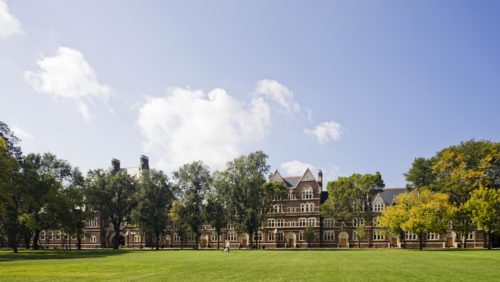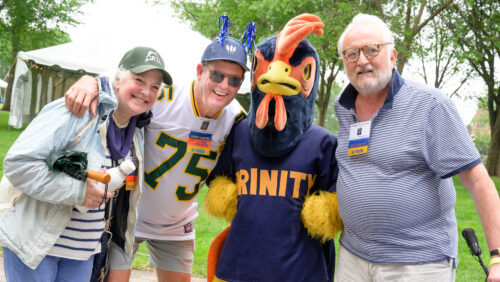Trinity’s Curriculum
Trinity's curriculum consists of a core liberal arts education plus so much more. The "plus" reflects the countless real-world learning opportunities that come from being a selective liberal arts college in a small, globally connected capital city.
The Trinity Plus Curriculum: Liberal Arts Education for the 21st Century
The Trinity Plus Curriculum, introduced in fall 2021, provides opportunities for applied and experiential real-world learning experiences while maintaining the strength of Trinity’s core liberal arts education.
Trinity’s distinctive liberal arts curriculum provides the opportunity for students to engage and connect conversations, methodologies, and diverse perspectives across the College’s academic divisions. Thirty-five total credits are required for graduation, composed of 32 academic credits, earned from the completion of divisional classroom-based courses, plus 3 credits which may be a combination of academic and co-curricular credits. Co-curricular credits emphasize practical learning which takes place beyond the traditional classroom and expand opportunities for applied research on campus as well as real-world learning in Hartford, and across the world.
The three plus credits, beyond Trinity’s required 32 academic credits, encourages students to think about which experiences (co-curricular, academic, or a combination) would best prepare them for their next steps after Trinity. Students may fulfill their Trinity Plus credits by taking an exploratory route: completing any combination of academic credits, co-curricular credits; or, by completing a faculty designed 3-credit Experiential Certificate.
An additional component of the plus is Trinity’s Wellness Program, which is designed to equip students to balance personal well-being with their social, academic, and extra-curricular requirements. This program addresses the whole-health of our students during their time at Trinity and prepares students to sustain positive behaviors in their post-graduate careers.
General Education
Fostering intellectual curiosity and core competencies, Trinity’s general education is designed to give each student the freedom to explore academic interests, discover passions, and acquire the breadth of knowledge integral to a liberal arts education. Our curriculum equips students with the flexibility of a general education and the capacity to become innovative thinkers.
Trinity’s general education curriculum has six key components:
- A First-Year Seminar. All students take a first-year seminar or participate in a Gateway Program, introducing them to the academic life of the college and reinforcing essential practices, including the capacity to write compellingly and read critically, conduct research and analysis, and communicate effectively and collaboratively.
- Foundational Skills. To have the basic tools needed to succeed in today’s world, students must demonstrate writing proficiency, quantitative literacy, and competency in a second language.
- Distributional Breadth. Since one of the hallmarks of a liberal arts education is breadth of knowledge, students take at least one course in each of these fields of study: the arts, humanities, natural sciences, numerical & symbolic reasoning, and social sciences.
- Writing-Intensive Courses. In reinforcing writing and critical thinking skills throughout a student’s four years, all students complete at least two writing-intensive courses, including the first-year seminar.
- Global Engagement. To thrive in a diverse global context, all students complete a course with a “global” focus or participate in a study-abroad program.
- Wellness Program. Trinity’s holistic approach to Wellness places an emphasis on how students care for themselves, one another, and their world, establishing and sustaining positive values, habits, and behaviors during their time at Trinity and beyond.
Majors and Minors
Depth is achieved through the majors and minors. We offer almost 40 majors and dozens of minors, both in traditional disciplines and interdisciplinary fields. Students are advised to choose majors that excite them, cultivate their personal strengths, and in which they are most likely to excel. In addition to acquiring depth in a particular field, majors and minors permit students to hone their writing, analytical, problem-solving or artistic skills; to develop close ties with a community of academic peers, and to enjoy intensive research and experiential learning opportunities. An integrating exercise, such as a seminar, thesis or final project, marks the capstone of a Trinity education.
To help students choose appropriate entry-level courses for select majors, please refer to this list based on recommendations from the academic department chairs.
Co-Curricular Opportunities
Co-Curricular courses emphasize practice, application, and experience-based learning, extending Trinity’s robust liberal arts education. These engagement opportunities satisfy credits towards the degree, and are available throughout the year. Students may choose to develop transformative leadership skills through teaching assistantships and peer mentorships, contribute to original scholarship through research assistantships with College faculty, and explore immersive application of experienced-based learning during the January term.
The city of Hartford as well as our program sites abroad further enhance learning possibilities, offering an abundance of co-curricular opportunities, from robust internships and student research grants to community learning projects and other forms of experiential learning and applied knowledge. Students in the arts, humanities, social sciences, and STEM disciplines all benefit from these offerings.
